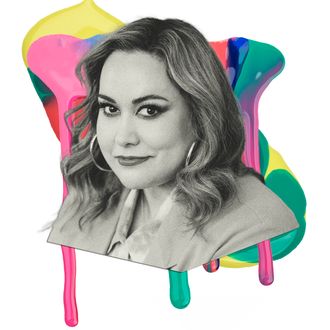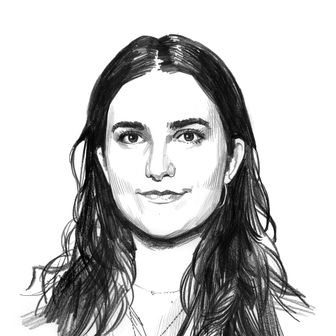
Tanya Saracho is a theater kid at heart, right down to her “Yes, and” attitude. And making theater was always the plan; she spent almost 15 years in Chicago working as a playwright, director, dramaturg, and actress — sometimes all at once — in theatrical productions, often at Teatro Luna, a local theater she co-founded with a collective of Latina thespians. When a UTA agent approached her, she says, “I didn’t understand that this meeting was like, ‘Do you want to be a TV writer?’ I had no training in TV, and the agent didn’t believe me.” Soon, she was in her first “kind of horrible” writers’ room: “But it was great because I wrote a play about it.”
She never stopped writing for the stage, even as she graduated from TV writer to showrunner on Vida. The critically acclaimed Starz series follows a pair of chaotic sisters as they deal with the grief and stress brought on by their mother’s death and their return to their childhood stomping grounds in L.A.’s Boyle Heights, where gentrification is creeping in. It’s intrinsically queer and Latine, and as delightfully messy as it is tragic. Most tragic of all, it was cut short when COVID-19 hit weeks before the third season aired; Saracho had originally planned for six.
After Vida ended, Saracho went straight back to work and juggled several projects in various stages until the WGA writers’ strike started in May. Speaking to the Cut from her home in L.A. during the strike, she detailed her intense usual schedule and how she dealt with suddenly having nothing to do.
On her morning routine:
Around 5:15 a.m., my asshole cat Roscoe starts meowing. It’s better than an alarm clock. By 5:30, I’m aware of the world, and even though I want to keep sleeping, I’m up, and I do grab my phone. I check for overnight messages from my friends in the U.K. When I’m physically gonna get up out of bed, I now do these mantras. I used to do three things I’m grateful for before getting out of bed, but now, I say three times: “I’m grateful for all the joy, abundance, and love that finds me today.” Then, three times: “I am open. I am ready. I receive.” I get up, and before feeding the cats, I light my altars. I turn on my Reuters app to hear the news, then I make coffee. I’m type 2 diabetic, so I have to take meds, and I take a shit ton of supplements. I usually have Pilates four times a week. And then I can start my day.
On the pace of her work:
I think most people who do what I do will say: Whatever looming deadline is loudest is the one that you’re going to be working toward. I’ve been in delivery mode for the past three and a half years. It’s all deadlines. There’s a lot of very early days and working until I can’t. When I’m working, I don’t stop to have human interactions unless they’re meetings about the projects. When I’m working like that, I don’t have much of a social life. I live alone, so I’m able to do that. That’s such a luxury, to be able to only worry about the work. You take that away from a workaholic, like this work stoppage, and you have a crisis of faith and an existential crisis, which is what I had in June.
The strike has been crazy because I’ve had weekends. And I don’t know what to do with myself on Sundays. Sundays are for work, usually. It’s not balanced. I’m not saying to do it like this. But I’m saying it’s a lovely luxury that I get to do it like this because I’ve kept my life so clean of personal stuff, which is not a way to live, I’ve realized during the strike, because I’m like, “Wait, so without work, what am I?” Oh, shit, who knows. But it has worked for me. I really love spending time with my characters. I love it.
On spirituality:
I do not make any move without consulting my brujas — and they’re plural. That’s always been so. I went to my first bruja when I was 11. I have four altars just in this room. I don’t start a project without prayer work. When it comes to big decisions, my agent knows — he’s like, “Alright, call your Señora and call me back.” He knows that that’s part of my process. People are like, “What? That’s how you live your adult life?” Yep. It works for me, I am a person who is not partnered. I live alone. And faith has to carry you through so much. Living through these years, it’s the only thing I can count on sometimes.
On what drives her:
I like wanting things and being able to get them for myself. I watched my mother, my aunts, my dad’s mistress, as much as I detest her, be trapped by men — be trapped by my father. I built a life with the least amount of shackles. It was in reaction to how I saw women being treated.
I don’t know what “making it” looks like, and I almost don’t want to chase it, but I know what it will feel like to have access. I don’t feel like I have the access that I want to have for myself and my stories and to give. Because that was the most fulfilling thing about Vida, the access I gave. We cannot have a movement until there’s more of us with access, and that’s bigger than any one of us. Just like the strike.
On the people who help her get it done:
I have [an assistant], Elizabeth Suarez, and she’s lovely. She puts up with me, that’s the main thing. I am such a Sag boss — I need to be left alone, but then I need a bunch of stuff. She’s good with my rhythm. I don’t drive, so she does have to do a lot of cat errands and things like that. She keeps my calendar — she reminded me about this call. She’s kind of like a stage manager. I have a cleaning lady that is my heart, and she’s home — and I understand how that might sound, the classist nature of the statement, but she has auntie energy, like, tía energy, and she scolds me all the time, and I love her for it. I buy a lot of lipstick, and she opens the boxes. She’ll be like, “Otro lipstick?” Like, another lipstick? I need my scoldings to keep me humble.
On money matters:
I have a group of friends and acquaintances in the industry, and we always talk about what we make. I think it’s empowering to be transparent, for us to understand our place and our value. I think it’s important to share with each other what we make and what we do with it, how we invest it. My dad was really good with his money. And I saw him discuss that behind closed doors, but never with me. And now I don’t have those tools. So I’m developing those tools. I hope I am.
I grew up with privilege in a certain culture where I wasn’t expected to think about money. I just asked the paternal figure. I didn’t have to worry about going to college — he paid. And even after college, until I was 26, he gave me an allowance. I never thought about it. And then the next thing I knew I was a starving artist in Chicago. My dad disowned me. And then I realized, shit, I have to think about it for the future. And I sort of became my own paternal figure because now I have dependents, the women in my family that fell for that patriarchal shit. That’s who I have to take care of now. It’s so funny because I purposely did not want to have children because I didn’t want to have dependents, and then it ended up that I did. It is cultural: I’m the daughter, I have to provide. It’s important. And I think of it with urgency, especially now that I’m unemployed.
On winding down at the end of the day:
I need to figure that out. I stay wired until I conk out. I do reach out. I have a lot of dear friends that are my heart, so I’ll have a FaceTime gossiping session with them. I don’t know how dinner happens. The earlier part of my day is all ritual. And the last part, I squander it. There’s no ritual.
This interview has been edited and condensed for length and clarity.





